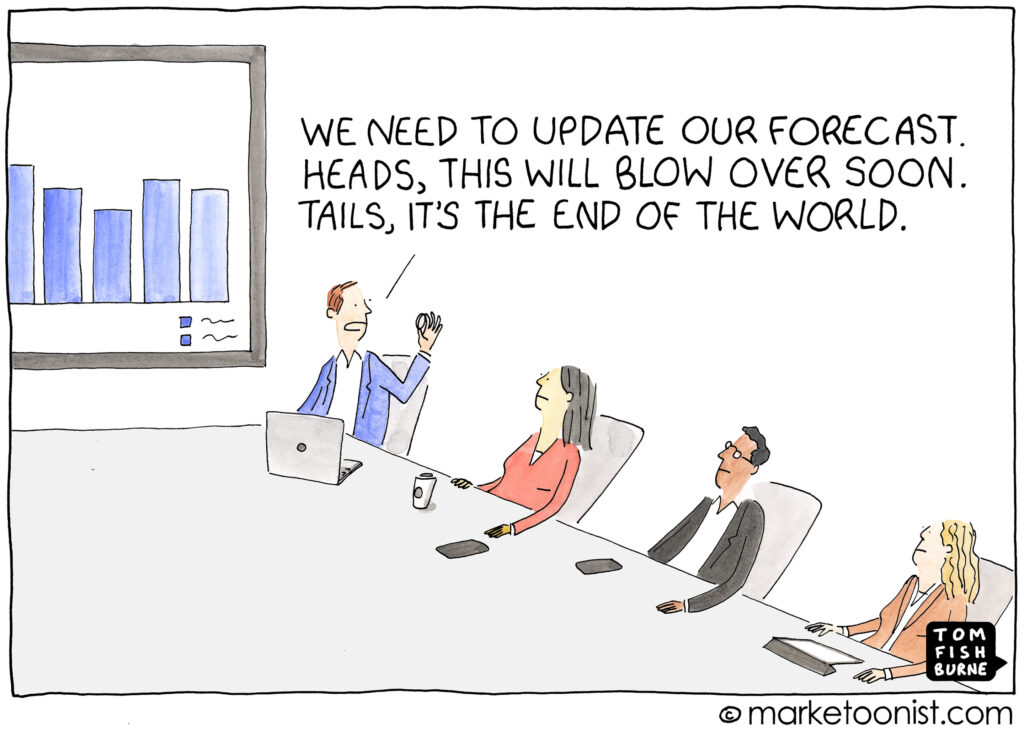You’re Stuck—But Don’t Know Why
Actually, it’s worse.
Ambivalent uncertainty is the invisible anchor that prevents your “business boat” from going anywhere.
When the market is “ambivalently uncertain” about your product or service—you’ve got two major problems:
- They don’t care about your product or service at all.
- They’re not even sure they need this product or service in the first place.
So, foundationally speaking, you’re really competing against apathy, ambivalence, procrastination, contemplation, and indecision.
Scary stuff, right?
And that’s BEFORE you compete with your real-life “tangible” competition in the market.
So, before you feel the need to “compete” with your in-market competitors, remember that you’ve got to deal with this ultimate emotional gatekeeper first.
There has been a lot of work done analyzing buyer behavior, buyer personas, etc.—in fact, there is a whole field of behavioral science related to decision-making that’s fascinating and well worth investigating if you want to build a business that lasts.
So, how in the heck do you combat ambivalent uncertainty?
For me, it starts with the “who cares test?”
To start, you must embrace four fundamental truths:
- You’re not the “smartest guy” in the room.
- You know what you know, and that’s all that you know.
- Nobody cares about you, your product, or your service.
- You’re in the transportation business—the goal is to move people from point A to point B safely and securely.
Once you change your paradigm thusly, you may begin to apply the “who cares test?”
It’s all about being real and calling yourself out on your assumptions.
Another Jay Abraham classic saying goes something like this…
“Make sure the initial assumptions you’ve made about the market/product/service are accurate—if not, everything that follows will miss the mark.“
Make sure that your value proposition, why you exist, etc. passes the “who cares test?”
What are the top ten benefits of your product or service?
Write the words “Who cares?” next to each one of them.
Do they pass muster?
Is it you who only cares?
Is it your ego that believes in the “build it and they will come?” line of BS?
It’s time to do some critical thinking!
Pretend you’re having a chat with Socrates, and everything you say about your business, your product, and your service is met with the following…
…”who cares?!”…
…”I know that YOU know nothing!”
The consumer is sophisticated and smart.
They won’t blindly believe your claims and promises.
First, you must articulate and believe in what you’re doing and why you’re doing it.
Are you adding any value?…
…alleviating consumer pain in the market?…
…transporting people from their “current place” to their “desired place?” …
…making THEIR world a better place?
Question your assumptions and apply the “who cares test?!” rigorously and you’ll be on your way.
Apathy + Indifference
Damn depressing.
Imagine a world where consumers lack any feeling, emotion, interest, concern, or excitement about anything and everything.
It may be coming too soon thanks to artificial intelligence, A.I.
I just read an article about the growing trend of using A.I.-generated “content” for “marketing” and how A.I. can deliver endless buckets of content instantaneously for “pennies on the dollar.”
Just what the world needs—more content!
Content for content sakes!
Imagine an evil car factory manufacturing self-driving A.I. powered cars with nobody inside and creating an endless stream of new vehicles on every road and highway in the country…
…driving around all day and night with no destination in mind.
Driving for driving’s sake.
It’s insane.
Infinite content for our infinitesimal world.
The possibilities are truly endless!
Unlimited reams of content being created 24/7 using A.I.—”making it rain” for marketers and advertisers alike.
Sure to drive the humblest, patient, and kind soul speechless, mute, and riddled with apathy, indifference, and lest we forget, the mother lode of all “ambivalent uncertainty.”
Some final thoughts here and shout out to minimalist architect Ludwig Mies van der Rohe.
More is less.
Less is more.
Minimal is maximal.
Maximal is minimal.
Stay unruly out there.
